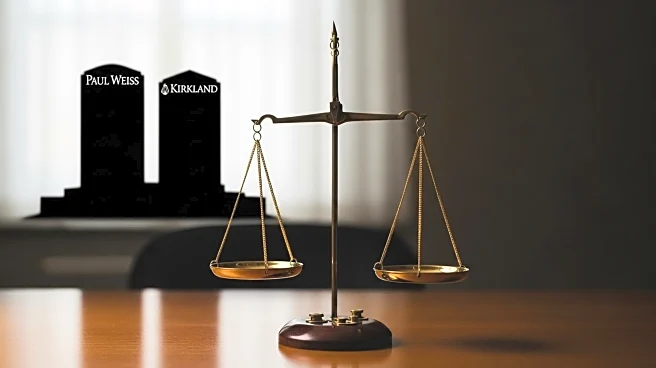What's Happening?
Lawmakers have raised concerns about the legality of pro bono work performed by law firms Paul Weiss and Kirkland for the Trump administration. The firms pledged millions in free legal services to the Commerce Department, which may violate the Antideficiency Act, a statute that prohibits the government from accepting voluntary services outside of emergencies. The firms had previously assured that their services would be directed towards charitable causes, but recent revelations suggest direct involvement with government work. The situation has prompted legislative inquiry, with top Democrats questioning the firms' compliance with legal standards.
Why It's Important?
The inquiry into Paul Weiss and Kirkland's work for the Trump administration highlights potential legal and ethical challenges facing law firms engaged in government contracts. The Antideficiency Act aims to prevent unauthorized financial obligations, and its violation could have implications for the firms' reputations and their ability to conduct business with the government. This development underscores the tension between legal compliance and political pressures, as firms navigate complex relationships with the administration. The broader impact on the legal industry includes potential scrutiny of pro bono arrangements and the need for firms to ensure compliance with federal statutes.
What's Next?
As lawmakers continue to investigate the legality of the firms' work for the Trump administration, Paul Weiss and Kirkland may face increased pressure to clarify their positions and ensure compliance with legal standards. The firms' responses could influence their relationships with government agencies and impact their reputations within the legal community. The administration's actions may also prompt further scrutiny and potential legal challenges, as other firms assess the risks of engaging in similar arrangements. The outcome of this inquiry could set a precedent for how law firms manage pro bono work and government contracts.
Beyond the Headlines
The situation raises broader questions about the ethical responsibilities of law firms in political contexts and the potential impact on the rule of law. The firms' involvement with the Trump administration highlights the challenges of balancing business interests with legal compliance and ethical considerations. This case may prompt discussions within the legal industry about the role of pro bono work in government relations and the importance of maintaining independence and integrity in legal advocacy.










